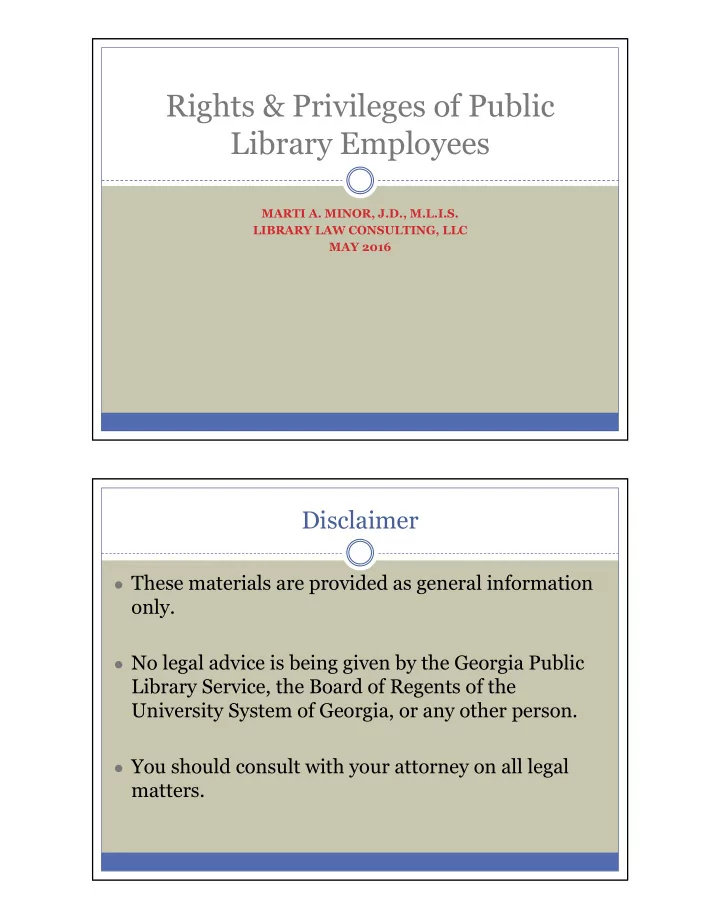

Rights & Privileges of Public Library Employees MARTI A. MINOR, J.D., M.L.I.S. LIBRARY LAW CONSULTING, LLC MAY 2016 Disclaimer ● These materials are provided as general information only. ● No legal advice is being given by the Georgia Public Library Service, the Board of Regents of the University System of Georgia, or any other person. ● You should consult with your attorney on all legal matters.
Discussions about Religion & Politics in the Workplace PARTICULAR CONCERNS FOR GOVERNMENTAL EMPLOYERS First Amendment Rights ● A public employer is prohibited from taking an adverse employment action against an employee for speaking out about matters of public concern. ○ Matters of public concern include politics and religion.
Caution about religion in the public workplace Establishment Clause Discrimination: Title VII ● Prohibits gov from making ● Requiring or coercing employee to abandon, alter, or any law “respecting an adopt a religious practice as a establishment of religion.” condition of employment. ● Subjecting employee to hostile ● Prohibits gov from favoring or abusive statements or one religion over another. conduct regarding religion. ● Applies to those who practice ● “Wall of separation a non-theistic religion and to those who profess no religious between Church and State." belief. Running for Elective Office SPECIAL RULES FOR PUBLIC EMPLOYEES
Governing Law Federal: Hatch Act State: O.C.G.A. § 45-10-70 ● Until 2012, prohibited ● Allows state employees many state and local gov to run for elective office employees from running that is part time and for elective office. does not conflict with ● Now, only applies to any official duties. employee whose salary is paid for completely by federal loans or grants. Specific Employer Policies Re: Elective Office ● BOR Policy 8.2.15.3: ○ Prohibits employees from holding state or federal office; allows for local elective office if it does not conflict or interfere with the employee’s duties and responsibilities to BOR. ● Many counties & cities prohibit ○ Georgia courts have held that any restrictions upon the right to run for elective office imposed by a government employer are constitutionally permissible where the government entity shows that curtailing the ability to run for office is reasonably necessary to achieve a compelling public objective.
Conflicts of Interest O.C.G.A. § 45-10-21 Georgia law recognizes: ● It is essential for public officials be independent and impartial, that governmental decisions and policy be made in the proper channels, that public office not be used for private gain, and that there be public confidence in the integrity of government. Sample Ordinance on Abstention
Retaliation MOST PREVALENT EEOC CLAIM Stats: EEOC Charges Before a lawsuit may be filed alleging employment discrimination or retaliation, a charge must be filed with the Equal Employment Opportunity Commission ● In 2010 retaliation claims overtook race claims as the most often filed EEOC charge and have risen steadily since then. ● By FY 2015, retaliation claims made up 44.5% of all EEOC claims ● Race claims were 34.7%; sex claims 29.5%
Stats: Lawsuits ● Employment cases make up the largest category of civil cases filed in federal courts. ● According to the Dept. of Labor, employee lawsuits have increased more than 400% in the past 20 years. ● Retaliation claims most prevalent. Retaliation Claims Proceed with caution when considering disciplining or termination an employee who recently: ○ Asked for or took family leave ○ Requested an accommodation ○ Filed or assisted another employee in filing a work-related claim (workers’ compensation, internal complaint, EEOC charge, lawsuit)
Internal Personnel Policies TIME FOR REVIEW Personnel Policy Basics Personnel policies should : ● Be in writing & maintained separately from other library policies ● Reflect overall mission and day-to-day practices ● Explain employer expectations & employee rights ● Be revised and updated regularly (at least every 3 years) ● Be well-communicated to employees
Wage & Hour Policies & Practices TIME FOR REVIEW Fair Labor Standards Act Requires employers to pay a minimum wage and compensate workers for overtime at a rate of 1.5 X hourly rate. ● Comp time accrual—public employers ○ Must be 1.5 hours of comp time for each hour of overtime worked ● Not every employee qualifies for OT ○ White Collar Exemptions
Changes to Salary Threshold for Exemption ● Currently: Salaried workers making more than $23,660 annually are exempt from OT requirements if the job is administrative or executive. ● As of December 1, 2016, salary threshold increases to $47,496. ● “Learned professionals” not entitled to OT regardless of salary. ● Public employees may still award comp time. Odds & Ends
Gender-specific Restrooms ● NC’s House Bill 2 ● Protests in Fannin County, Ga. at last week’s school board meeting—parents upset because school board indicated that any transgendered students would use RR of gender identity regardless of biological sex. ● Guidance issued from Obama administration--- requiring transgendered to use RR consistent with anything other than gender identity is a violation of federal civil rights law. Debt Collection: Taking Action on Returned Checks ▪ Statute of limitation: 6 years ▪ Pursuant to O.C.G.A. § 13-6-15, payee can seek: ▪ Amount of original check ▪ Double amount as damages (up to $500) ▪ Court costs ▪ Service charge (the greater of $30 or 5% of amount of check) ▪ Any financial institution charge for returned check ▪ Detailed procedure contained in the statute
Time for Summer Reading!
Recommend
More recommend